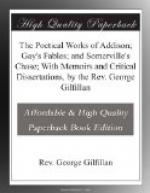Charles Montague, himself a poet of a certain small rank, and a man of great general talents, became—along with Somers—the patron of Addison. He diverted him from the Church, to which his own tastes seemed to destine him, suggesting that civil employment had become very corrupt through want of men of liberal education and good principles, and should be redeemed from this reproach, and declaring that, though he had been called an enemy of the Church, he would never do it any other injury than keeping Mr Addison out of it. It is likely that the timid temperament of our poet concurred with these suggestions of Montague in determining his decision. His failure as a Parliamentary orator subsequently seems to prove that the pulpit was not his vocation. After all, his Saturday papers in the Spectator are as fine as any sermons of that age, and he perhaps did more good serving as a volunteer than had he been a regular soldier in the army of the Christian faith.
Somers and Montague wished to employ their protege in public service abroad. There was, however, one drawback. Addison had plenty of English, Greek, and Latin, but he had little French. This he must be sent abroad to acquire; and for the purpose of defraying the expenses of his travels, a pension of L300 a-year was conferred upon him. Paid thus, as few poets or writers of any kind are, in advance, and having his fellowship besides, Addison, like a young nobleman, instead of a parson’s son, set out upon his tour. This was in the summer of 1699. He was twenty-seven years of age, exactly one year younger than Byron, and three years younger than Milton, when they visited the same regions. He went first to Paris, and was received with great distinction by Montague’s kinsman, the Earl of Manchester, and his beautiful lady. He travelled with his eyes quietly open, especially to the humorous aspects of things. In a letter to Montague he says that he had not seen a blush from his first landing at Calais, and gives a sarcastic description of the spurious devotion which the example of the old repentant roue, Louis XIV., had rendered fashionable among the literati of France: “There is no book comes out at present that has not something in it of an air of devotion. Dacier has been forced to prove his Plato a very good CHRISTIAN before he ventures upon his translation, and has so far complied with the taste of the age, that his whole book is overrun with texts of Scripture, and the notion of pre-existence, supposed to be stolen from two verses of the prophets.” The sincere believer is usually the first to detect and be disgusted with the sham one; and Addison was always a sincere believer, but he had also that happy nature in which disgust is carried quickly and easily off through the safety-valve of a smile.




